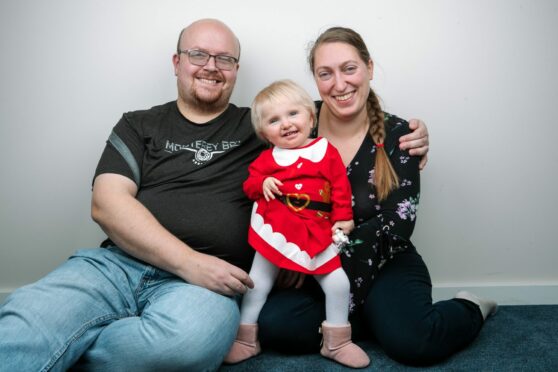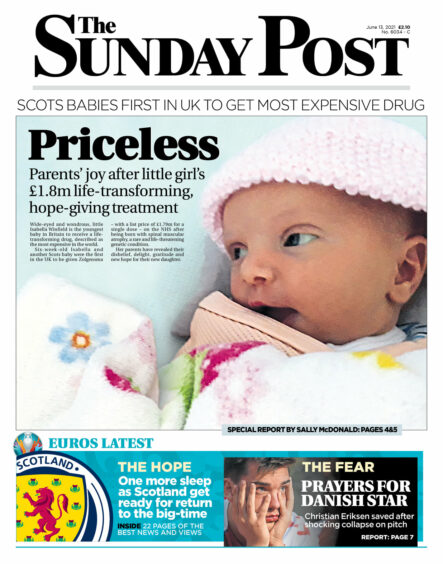
It was only a tiny step but to the parents of little Isabella Winfield it was another astonishing milestone in a miraculous journey.
Margaret Paluszynska and Richard Winfield have revealed how their 18-month-old baby daughter, who has a rare muscle-weakening illness, has taken her first steps thank to a £1.79 million drug prescribed just after she was born.
We told in June 2021 how Isabella was at the time the youngest child in the UK to be given the single-dose drug Zolgensma and among the youngest in the world.
Doctors and her family hoped it would transform the life of a little girl who, without it, may never have been able to sit, stand or walk. Five days later, five-month-old Arthur Morgan became the first baby in England to get the drug.
Isabella was born in 2021 with Type 1 SMA (spinal muscular atrophy), the most severe form of the rare degenerative illness that occurs in only three cases each year in Scotland. It affects the motor neurons, nerve cells located in the spinal cord that control voluntary muscle movement.
Because the muscles cannot respond to signals from the nerves, they atrophy – weaken and shrink – from inactivity. It also causes a range of life-shortening health issues, including breathing and swallowing difficulties.
The little girl from Archiestown, in Moray, is one of only two infants born in Scotland who have so far been treated with the potentially life-saving drug – a gene therapy – described as the world’s most expensive.
Glasgow’s Royal Hospital for Children had given the first UK dose in February 2021 to a baby – who remains anonymous – with Isabella receiving the treatment in May, just 20 days after her birth and a week after diagnosis. There was no guarantee, however, the ensuing treatment would work and at the time her translator mum, 36, and IT trainer dad, 37, did not dare to dream that their daughter would even sit, much less take her first steps, albeit with a little support.
Today Isabella’s parents and her doctor told of the significance of the development. Paluszynska told The Sunday Post: “Isabella has taken her first assisted steps. I wasn’t expecting it. I didn’t think she was ready. It was a complete surprise. It is the Christmas gift we couldn’t even dream of.”
Winfield added: “It was never set in stone that she would walk, the doctors always said the chances were 50-50, that she might, but not to get our hopes up. It is truly remarkable. We couldn’t be happier.”
Glasgow-based paediatric neurologist Iain Horrocks explained: “Without her parents’ vigilance there is little chance we would have treated her so early and therefore little chance she would have progressed developmentally so far so quickly to achieve this landmark milestone.
“Isabella’s success is a combination of very early treatment, with committed and aware parents who are tuned into her every requirement. This really is a success story we can be proud of in Scotland.”
Reliving the landmark moment, Isabella’s mother said: “I had been trying to encourage her to stand for a few months, with me stabilising her hips in case she fell. It was a slow build up, one day for three seconds, another day a little bit longer, and with me lessening the support to let her bear more weight herself.
“Then when we were in the park recently I tried to see if she would stand alone and unaided on a bench with her back against the arm rest. I stood close but let her go altogether. She managed it, so I let her do it a few times. Then a few days later, I tried doing it again, but allowed her to rest her hips against my hands for a little weight bearing support, and she just put one leg forward, then the other and before I knew it, she was on the other side of the bench.
“Although she doesn’t yet have the core strength to walk entirely unsupported, the steps are completely her own, she moves her legs herself. It’s amazing.”
Horrocks said: “We have treated no other children in Scotland with this drug so far, just the two. But we are hoping a screening programme for all the children might start within 2023, so we can pick them all up and treat them all as early as Isabella.”
And Isabella’s parents are also backing calls for routine screening. Her mother, who has a family history of the condition, but had not thought her child would be affected because there was no evidence of it on her partner’s side, explained: “For SMA to manifest, it needs two carriers of the recessive gene or in extremely rare cases a mutation to occur in one parent.”
Zolgensma – a gene therapy given intravenously as soon after birth as possible – can be effective in its treatment, but even when successful, sufferers may still have weakness which means they require some support with sitting and walking until muscles strengthen through use and with physiotherapy. Isabella’s family do not know how long it will be before she gains the strength to walk entirely independently. And they say she may, in the future, still need the occasional use of crutches or a wheelchair.
Horrocks said Zolgensma, given in a single, life time, intravenous dose, is a “game-changer”. He previously said: “Zolgensma is a wonder drug. It is a true gene therapy. We replace the gene and no further treatment is potentially needed.” There are other effective interventions, such as Spinraza, but it is a chemical, given every four months for life via an injection into the spinal canal.
Isabella’s parents are delighted by her progress so far and say they are grateful to have received the drug on the NHS. Her mum said: “For the first 12 months of her life every little improvement felt like it took forever and even then it wasn’t massive. And then, after her first birthday, that changed. The first big milestone came in June when she was lying on her back and managed to roll to one side and then to the other. She was finally starting to do things for herself, her leg and core strength were coming and she has literally been on a roll ever since.
“From where she was at in June, to taking steps now, is a staggering development and one we could not have dared to hope for when she was born.
“Now, seeing her progress, we can be more confident that at some point she will catch up to a level where, apart from certain weaknesses, she won’t be too different to other kids. She might be more easily exhausted but compared to the fact that without Zolgensma, she probably wouldn’t be able to breathe without support, or feed without a tube in her tummy, it’s a very small frustration.”
Charity calls for earlier treatment and newborn screening
In the last three years the NHS has revolutionised care for those who have SMA by funding access not only to Zolgensma but also two other ground-breaking treatments – Spinraza and Evrysdi.
These have been life-saving for babies with the most severe SMA, who previously would have died before the age of two.
According to the charity Spinal Muscular Atrophy (SMA) UK, if these treatments are delivered prior to symptom onset, better health outcomes can be achieved, and many sufferers would benefit from normal neuromuscular development. But if started once muscle weakness has developed and irreversible damage has been done, most will never walk independently and many will need artificial ventilation, nutritional support and 24/7 care at high cost to children and their families, and the NHS.
Newborn screening is the fastest route to diagnosis and timely treatment but this doesn’t happen in the UK, meaning many are missing this critical treatment window.
Many European countries are already moving to newborn screening. In the US 99% of babies are already screened for SMA. New data has shown that screening will generate savings of over £67 million across the lifetime of all of the babies identified in any given year.
The UK National Screening Committee (NSC) has started work to review whether to recommend that SMA is added to the NHS newborn blood spot screening programme.
The UK SMA Newborn Screening Alliance is now urging the NSC to quickly complete the review so that in the UK we #ScreenTodayForSMA.

Enjoy the convenience of having The Sunday Post delivered as a digital ePaper straight to your smartphone, tablet or computer.
Subscribe for only £5.49 a month and enjoy all the benefits of the printed paper as a digital replica.
Subscribe
 © Andrew Cawley
© Andrew Cawley